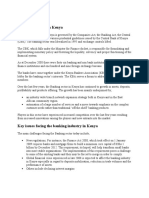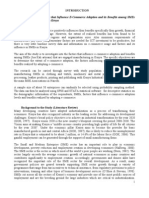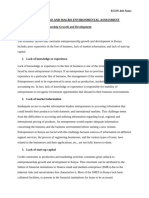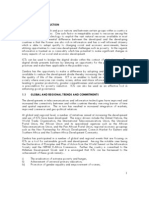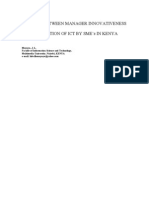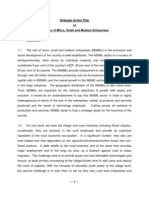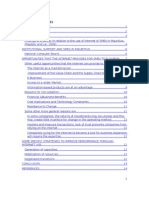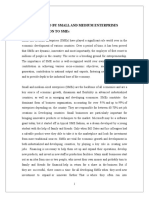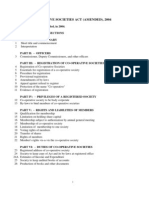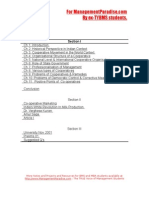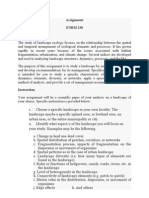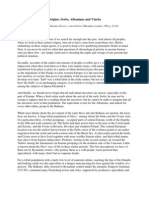Challenges Facing Entrepreneurs in Thika County
Challenges Facing Entrepreneurs in Thika County
Uploaded by
Senelwa AnayaCopyright:
Available Formats
Challenges Facing Entrepreneurs in Thika County
Challenges Facing Entrepreneurs in Thika County
Uploaded by
Senelwa AnayaCopyright
Available Formats
Share this document
Did you find this document useful?
Is this content inappropriate?
Copyright:
Available Formats
Challenges Facing Entrepreneurs in Thika County
Challenges Facing Entrepreneurs in Thika County
Uploaded by
Senelwa AnayaCopyright:
Available Formats
CLASS ASSIGNMENT ON: CHALLENGES FACING ENTREPRENURSHIP DEVELOPMENT IN THIKA COUNTY
HEE 4102: ENTREPRENEURSHIP DEVELOPMENT
PRESENTED BY: GEOFFREY G. KAMAU FANICE J. NAFULA MARY SITUMA WILBERFORCE SENELWA REBECCA GITHAIGA HD 413/2071/2011 HD 413/2073/2011 HD 413/2666/2011 HD 433/2069/2011 HD 433/2075/2011
PRESENTED TO: MUKULU, E. (PhD)
Submitted to the Entrepreneurship and Procurement Department in the School of Human Resource Development in Partial Fulfillment of the Requirements for the Award of Doctor of Philosophy in Entrepreneurship of Jomo Kenyatta University of Agriculture and Technology
November 2011
INTRODUCTION 1.1 Background Information of Thika Town
Thika town which is located in Kiambu County is 46 kilometers North East of Nairobi City. It is an administrative unit made up of four districts which were curved out of the larger Thika District namely; Thika West, Thika East, Ruiru and Gatanga Districts. The town which is the headquarters of Thika District is externally serviced by a dual carriage to Nairobi, a highway to Garissa and also a railway line. Internally, the town has a well-maintained road network. Thika Municipality measures about 93 square kilometers and has a population of 150,000 at night and 350,000 people, during the day (KNBS, 2011). Many of the people are employed in factories within the town. The main economic activities of Thika include agriculture, in particular, horticulture (pineapples and flowers), and coffee. The town, is nicknamed The Birmingham of Kenya as it is home to large industries including tanneries, textiles, footwear, food processing, motor vehicle assembly and cigarette manufacturing and over a hundred light industries. The service sector is also well represented with the growth & establishment of a number of educational & financial institutions making it home to three universities, tens of middle level colleges, hundreds of secondary and primary schools and dozens of financial institutions, and vibrant telecommunication and hospitality. Some of the attractions that draw visitors to Thika include the majestic Chania Falls, Thika Falls, Ol Donyo Sabuk National Park and historical sites like the Mugumo Gardens, Christina Wangare Gardens, which is in the heart of Thika Town. The greatest role in administration and registration of businesses in Thika is vested on the Local Authorities, beside other arms of the government.
2.0
CHALLENGES OF ENTREPRENEURSHIP DEVELOPMENT IN THIKA 2.1 Endogenous (Internal) Challenges
These are challenges that arise from the internal environment of the enterprise such as inadequate enterprise management skills, inadequate education and training, inadequate finance, deficient human resources and technology. Largely all these are challenges that the enterprise can control. To a large extent these challenges are compounded by the inherent limitations of Micro and Small Enterprises (MSEs) due to their liability of smallness. MSEs are disproportionately affected by limited capital, unskilled labor, and inability to attract competent personnel, low levels of adoption of technologies, poor quality products and inadequate market access. Majority of enterprises in Thika are Micro and Small Enterprises so they are affected by; 2.1.1 Lack of Entrepreneurial Teams Management Skills
The typical owner or manager of a small business develops their own approach to management through a process of trial and error, thus they are ill prepared to face changes in the business environment and to plan appropriate changes to technology. The majority lack educational background hence they may not be well equipped to carry out managerial routines for their enterprises (King & McGrath, 2002). Little attention is given to capacity building of the human resource which is necessary for business growth. Preparation of business plans is seldom given importance and proper record keeping is not practiced as the majority of enterprises operate informally. 2.1.2 Lack of Access to Finance
Since the majority of enterprises are MSEs, they are faced with traditional challenges of accessing finance. They therefore turn to expensive financing such as shylock, Microfinance Institutions (MFIs), Rotating Savings and Credit Associations (ROSCAs), instead of the
4
conventional credit from banks and equity in the stock exchange. Moreover women entrepreneurs are especially constrained as they lack the necessary collateral to enable them secure bank loans. Lending conditions which include high interests, availability of collateral, high bank charges and fees can be a big challenge to low earning entrepreneurs. Financial constraints remain a major challenge facing MSEs in Kenya (Wanjohi & Mugure, 2008) and this is the situation in Thika as well. 2.1.3 Poorly Skilled Human Capital.
Human capital is the most critical resource in an enterprise. The ability of an enterprise to attract and retain competent Human Resource is paramount to the success of an enterprise. In Thika, the majority of workers in farm-based enterprises are illiterate. Furthermore, most MSEs are not able to develop their human capital through education and training so as to improve enterprise performance. 2.1.4 Low Adoption of Technology
Farm and non-farm enterprises that adopt technology are able to be cost-effective and to create innovative and quality products that can compete in the local and international market. Despite various interventions as outlined in the Sessional Paper No.2 of 1992 on Small Enterprises and Jua Kali Development in Kenya led to the establishment of special business development services such as Jua Kali sheds. However, there is still low adoption of technology in these Jua Kali industries in Thika. For example, farmers are still using rudimentary farm implements and uncertified seeds leading to low farm productivity. The farm produce is often sold in its raw form without any processing or value-addition and poor handling and storage technologies result in high post-harvest losses. Whereas Thika produces a lot of milk, eggs and pineapples, farmers do not get maximum income due to lack of adoption of value-addition technologies. Many enterprises in Thika appear to be unfamiliar with new technologies and regard them as
5
either unavailable or unaffordable. There also seems to be is a wide digital divide between the rural and urban Thika. 2.2 Exogenous (External) Challenges.
An enterprise may be influenced by the external environment in which it operates. Some of the external challenges include industry or market competition, policy and regulatory framework, technology, the economic environment, access to markets, infrastructure, the political environment and security among others. 2.2.1 Competition
New competitors emerge all the time thus reducing the market share for existing entrepreneurs. As a result of this, MSEs face stiff competition from both small and larger enterprises. Thikas proximity to Nairobi City has caused competition from Nairobi- based enterprises as customers prefer to purchase from Nairobis larger enterprises. Further, the emerging shopping malls such as Tuskys Supermarket are affects small estate shops and kiosks as more customers prefer to stock the monthly major purchases from these bigger shopping outlets due to variety and other perceptions. Further small transporters (motorbikes, bicycles, and three-wheeled motorized vehicles) are losing their business to commuter vehicles which carry more passengers and charge less, due to improved intercity road network. 2.2.2 Unconducive Policy and Regulatory Frameworks
The Municipal Council and the County Council are mandated to regulate and licence businesses within their areas of jurisdiction. However, the licencing procedures are laborious, bureaucratic, tedious and duplicative. High licence fees are charged to some MSEs on daily basis and in some cases the Councils have had to demolish stalls owned by MSEs without notice. Other frustrations include confiscation of merchandise and dehumanizing treatment of merchants by the Councils. The large enterprises are not spared either for some complain of
6
exorbitant council rates and cost of electricity. Together with this unpredictable government policies coupled with grand corruption, high taxation rates pose a great threat to the sustainability of businesses in Thika. Little interaction exists if any between the policy makers and the enterprises so as to pull a common understanding and goodwill in policy and regulation formulation and administration. 2.2.3 Poor Infrastructure
This includes roads, electricity, telephones, internet connection, water and access to markets. Infrastructure creates a conducive environment for enterprises to thrive. Although Thika is well served with good infrastructure, there has been a record of high crime incidences leading to the demise of some key entrepreneurs. Furthermore, the electricity supply is unreliable with frequent power rationing and blackouts results significant losses for entrepreneurs and some factories are incapacitated and unable to meet their production targets.
2.2.4 Lack of Market Information
Enterprises in Thika especially MSEs who make the majority continue to rely on private and physical networks for market related information. Rural enterprises, largerly MSEs, are unable to interpret statistical data (Muteti, 2005). There are few or no linkages between MSEs and large enterprises to enable the MSEs to benefit in the value chains of various products. For example, small scale pineapple farmers of Kamwangi division cannot sell their produce to Delmonte and small scale coffee farmers of Gatanga constituency cannot sell their produce through Thika Coffee Mills. This means that large enterprises in Thika are delineated from small enterprises.
2.2.5
The Political Environment
The 2007 Post Election Violence (PEV) displaced and relocated some MSEs and employees especially those working in flower farms to politically safer grounds. Although the reaction of the upcoming 2012 National Elections is not clear, the political undertones are clear as the region is predominantly pro current government and uncertainty is rife on what would be the outcome of these impending elections. The new constitution is also likely to bring about a lot of changes in the composition and structure of government and therefore policies affecting businesses after 2012 and the new constitution full implementation are very uncertain. 2.2.6 The Macro Economic Environment
There presently escalating inflation has affected the cost of fuel and other commodities. Employees are agitating for higher salaries and wages because of the high cost of living. Real estate developers in Thika have recorded a decline in sales of houses due to the high mortgage costs levied on their clients by banks which has been occasioned by the Central Bank of Kenyas review of the base lending rates. Furthermore, the cost of land in Thika has escalated rapidly making it difficult for entrepreneurs to purchase and develop land for business. In addition, the fluid performance of the Kenyan Shilling against the major World Currencies has affected many businesses that rely on imports for their inputs and supplies. In the international economic environment, there are growing concerns on quality of products originating from certain countries in the international market. This has resulted in the adoption of ISO certification and Eurep-Gap protocols for many industries in Thika. Quotas set by trading blocks are also limiting the exports and imports of commodities from certain countries.
3.0
CONCLUSION AND RECOMMENDATION
Whereas the general environment in Thika is conducive to entrepreneurship, the MSEs are disproportionately constrained against the larger enterprises. It would be necessary for the policy framework to be proactively directed towards recognizing the unique challenges of MSEs such as the ones in Thika. Administration of Policies by the Local Councils should be friendly to enterprises, avoiding excessive ambition in revenue collection but creating a participatory approach to encourage more voluntary compliance as the enterprises realize value from revenue levied from them by the local authorities. A department for Business Development Services Support should be established in the Local Authorities offices to assist entrepreneurs in various services that would make nascent entrepreneurs easily start successful businesses as well as support those already running. So the government role should extend beyond regulation to facilitation of business. Training in managerial and technical skills for SMEs and setting up business information centres will improve the business management skills of entrepreneurs. Infrastructure services should be improved and zoning for businesses may assist in locating key infrastructure requisite to them.
REFERENCES King, K. & Mcgrath, S., 2002. Globalisation, Enterprise and Knowledge: Education, Training and Development in Africa. Wallingford: Symposium Books. Kenya National Bureau of Statistics (2011). http://www.knbs.or.ke/detailed_population_results.php. Reviewed on November 25, 2011. Republic of Kenya (1992). Sessional Paper No.2. Small Enterprise and Jua Kali Development in Kenya. Nairobi: Government Printers. Wanjohi, A. (2008). Challenges facing SMEs in Kenya. http://www.buzzle.com/articles/challenges-facing-smes-in-kenya.html
10
You might also like
- Banking in Kenya & Its ChallengesDocument5 pagesBanking in Kenya & Its ChallengesSenelwa Anaya100% (2)
- Reseach Project Sample - Diploma in Business KimDocument23 pagesReseach Project Sample - Diploma in Business Kimcmmondieki100% (2)
- Biodiversity Lab HandoutDocument5 pagesBiodiversity Lab HandoutJenniferNo ratings yet
- ECON 444 Topic 4 NotesDocument8 pagesECON 444 Topic 4 NoteslynnettemboteNo ratings yet
- NabutolaFactors Influencing Performance of Small and Medium Enterprises in The Central Business District - PDFDocument95 pagesNabutolaFactors Influencing Performance of Small and Medium Enterprises in The Central Business District - PDFKyla Buot VergaraNo ratings yet
- The Impact of Information and Communication Technologies (Ict) On Small and Medium Scale Enterprises (Smes) in The Kumasi Metropolis, Ghana, West AfricaDocument8 pagesThe Impact of Information and Communication Technologies (Ict) On Small and Medium Scale Enterprises (Smes) in The Kumasi Metropolis, Ghana, West AfricaMuhammad SholehNo ratings yet
- Eme AsfDocument10 pagesEme AsfGeorge LemaNo ratings yet
- Issues, Challenges and Prospects of Small and Medium Scale Enterprises (Smes) in Port-Harcourt City, NigeriaDocument14 pagesIssues, Challenges and Prospects of Small and Medium Scale Enterprises (Smes) in Port-Harcourt City, NigeriarexNo ratings yet
- Agwu 101-114Document14 pagesAgwu 101-114DejiNo ratings yet
- Challenges Facing Micro and Small Enterprises in Accessing Credit Facilities in Kangemi Harambee Market in Nairobi City County, KenyaDocument25 pagesChallenges Facing Micro and Small Enterprises in Accessing Credit Facilities in Kangemi Harambee Market in Nairobi City County, KenyaKruh Kwabena IsaacNo ratings yet
- Duplichecker Plagiarism ReportDocument2 pagesDuplichecker Plagiarism Reportsuryajaiswar2002No ratings yet
- Factors Discouraged Businesses in The Nigeria EnvironmentDocument4 pagesFactors Discouraged Businesses in The Nigeria EnvironmentmatthewekpahNo ratings yet
- John Paul B Galgo TECHNODocument2 pagesJohn Paul B Galgo TECHNOtuyornyljanNo ratings yet
- Micro Finacnce ProposalDocument5 pagesMicro Finacnce ProposalFODAY S. KAMARANo ratings yet
- Challenges of Financing Small Scale Business Enterprises in NigeriaDocument66 pagesChallenges of Financing Small Scale Business Enterprises in NigeriaShaguolo O. Joseph100% (3)
- MICRO AND SMALL ProjectDocument17 pagesMICRO AND SMALL ProjectJapgur Kaur100% (1)
- Case Study-Exec. Summary Na LangDocument21 pagesCase Study-Exec. Summary Na LangplukchristianmoscaNo ratings yet
- Private Sector Development and Operations Midterm ExamDocument17 pagesPrivate Sector Development and Operations Midterm ExamKarylle EntinoNo ratings yet
- 1) Introduction: Individual Assignment of Challenges and Opportunities of Small Business in EthiopiaDocument9 pages1) Introduction: Individual Assignment of Challenges and Opportunities of Small Business in Ethiopiasara Eshetu100% (3)
- Small Business in Kenya PDFDocument7 pagesSmall Business in Kenya PDFSenelwa Anaya100% (1)
- Problems Faced by MSMEs in India (ED-Unit 4)Document7 pagesProblems Faced by MSMEs in India (ED-Unit 4)Manoj VatsNo ratings yet
- التحول الرقمي للشركات الصغيرة والمتوسطة في ظل جائحة كوفيد-19 (كورونا)Document8 pagesالتحول الرقمي للشركات الصغيرة والمتوسطة في ظل جائحة كوفيد-19 (كورونا)sm3977263No ratings yet
- Submitted To:: Hamida Akhter Lecturer Dept. of MIS University of DhakaDocument7 pagesSubmitted To:: Hamida Akhter Lecturer Dept. of MIS University of DhakaMD.Tahjibul AlamNo ratings yet
- HND I, Lecture NoteDocument64 pagesHND I, Lecture NotematthewekpahNo ratings yet
- Technology in MicrofinancingDocument4 pagesTechnology in Microfinancingshivendra singhNo ratings yet
- Technological Environment Impacting Entrepreneurship: Submitted To:prof. Brajballav KarDocument6 pagesTechnological Environment Impacting Entrepreneurship: Submitted To:prof. Brajballav KarVedika AgrawalNo ratings yet
- National ICT PolicyDocument65 pagesNational ICT PolicySechwayo NzimaNo ratings yet
- MBA 224 Managerial AccountingDocument3 pagesMBA 224 Managerial AccountingJam AlagNo ratings yet
- Electronic Business and Performance of Smes in UgandaDocument42 pagesElectronic Business and Performance of Smes in UgandaAtukwatse Ambrose100% (1)
- Roadmap For Digital Technology To Foster India's MSME Ecosystem-Opportunities and ChallengesDocument12 pagesRoadmap For Digital Technology To Foster India's MSME Ecosystem-Opportunities and ChallengesRAHUL DEVNo ratings yet
- Chapter 2 - Literature ReviewDocument26 pagesChapter 2 - Literature ReviewThomas EmmanuelNo ratings yet
- Kottai and Karthick RajaDocument3 pagesKottai and Karthick Rajanaascom18No ratings yet
- Dissertation BodyDocument78 pagesDissertation BodylmugambiwaNo ratings yet
- An Assessment of Business Environment & New Vistas For Small, Medium & Tiny Entrepreneurs in India (Yr.2011)Document10 pagesAn Assessment of Business Environment & New Vistas For Small, Medium & Tiny Entrepreneurs in India (Yr.2011)Amit BhushanNo ratings yet
- Small and Medium Enterprises' (Smes) Access To Finance: PhilippinesDocument48 pagesSmall and Medium Enterprises' (Smes) Access To Finance: Philippinesbrendan lanzaNo ratings yet
- The Use of Information and Communication Technology (ICT) and Business Management: Contemporary Issues and ChallengesDocument18 pagesThe Use of Information and Communication Technology (ICT) and Business Management: Contemporary Issues and ChallengesWorth ItNo ratings yet
- Sample Endline ReportDocument22 pagesSample Endline ReportDanika Christyn Astilla-MagonciaNo ratings yet
- 7-Factors Inhibiting New Venture Creation and Problems and Prospects of MSEs in TanzaniaDocument20 pages7-Factors Inhibiting New Venture Creation and Problems and Prospects of MSEs in TanzaniaDeogratias LaurentNo ratings yet
- Full Paper THE LINK BETWEEN MANAGER INNOVATIVENESS AND ADOPTION OF ICT BY SME's IN KENYADocument81 pagesFull Paper THE LINK BETWEEN MANAGER INNOVATIVENESS AND ADOPTION OF ICT BY SME's IN KENYAJacob Luballo Muyoyo GanglaNo ratings yet
- Proposal On Assesment of Absaenteeism The Case of Ethio Telecom V2Document24 pagesProposal On Assesment of Absaenteeism The Case of Ethio Telecom V2Juh Men83% (6)
- FACTORSAFFECTING2Document10 pagesFACTORSAFFECTING2Hambeca PHNo ratings yet
- MSME Strategic Action PlanDocument27 pagesMSME Strategic Action PlanRakesh SinghNo ratings yet
- Article 23 The Role of Micro-Finance Institutions PDFDocument14 pagesArticle 23 The Role of Micro-Finance Institutions PDFbioduny2kNo ratings yet
- Adoption of E-Business by Small and Medium Enterprises in Kenya: Barriers and FacilitatorsDocument11 pagesAdoption of E-Business by Small and Medium Enterprises in Kenya: Barriers and FacilitatorskettyNo ratings yet
- Problems of SMEDocument18 pagesProblems of SMErohitbatraNo ratings yet
- BlogDocument6 pagesBlogCharu SharmaNo ratings yet
- Diffusion of ICT Innovation and E-Business Adoption in Agribusiness SMR'S: A Developing Country PerspectiveDocument20 pagesDiffusion of ICT Innovation and E-Business Adoption in Agribusiness SMR'S: A Developing Country PerspectiveADITYA SHARMA 1927706No ratings yet
- Impact of Internet On SMEs in MauritiusDocument15 pagesImpact of Internet On SMEs in MauritiusCelia FridayNo ratings yet
- ShankoreDocument10 pagesShankoreAbdela Aman MtechNo ratings yet
- Role of SME's in Economic GrowthDocument7 pagesRole of SME's in Economic GrowthAlina JamilNo ratings yet
- Submitted ToDocument5 pagesSubmitted Tosrabon ahmedNo ratings yet
- Final Micro FinanceDocument28 pagesFinal Micro FinanceNagaraj GadiputiNo ratings yet
- Challenges Affecting The Performance of Small and Medium Scale Enterprises (Smes) in NigeriaDocument24 pagesChallenges Affecting The Performance of Small and Medium Scale Enterprises (Smes) in Nigeriasolex341No ratings yet
- Ajith Kumar and JeevananthamDocument4 pagesAjith Kumar and Jeevananthamnaascom18No ratings yet
- Small and MediumDocument29 pagesSmall and MediumLamaro HololoNo ratings yet
- Determinants of Micro and Small Enterprises Growth in Ethiopia PDFDocument14 pagesDeterminants of Micro and Small Enterprises Growth in Ethiopia PDFetebark h/michaleNo ratings yet
- Chapter One 1.0Document6 pagesChapter One 1.0Fredrick100% (1)
- Small and Medium EnterprisesDocument19 pagesSmall and Medium EnterpriseskalaivaniNo ratings yet
- Harnessing Technology for More Inclusive and Sustainable Finance in Asia and the PacificFrom EverandHarnessing Technology for More Inclusive and Sustainable Finance in Asia and the PacificNo ratings yet
- The Future of Entrepreneurship: Trends and Opportunities in a Rapidly Changing WorldFrom EverandThe Future of Entrepreneurship: Trends and Opportunities in a Rapidly Changing WorldNo ratings yet
- Approaches To Regulation of The ICT Sector - 8Document5 pagesApproaches To Regulation of The ICT Sector - 8Senelwa AnayaNo ratings yet
- Approaches To Regulation of The ICT Sector - 4Document224 pagesApproaches To Regulation of The ICT Sector - 4Senelwa AnayaNo ratings yet
- Co-Op 0-10 PDFDocument187 pagesCo-Op 0-10 PDFSenelwa AnayaNo ratings yet
- The Co-Operative Societies Act (Amended), 2004Document46 pagesThe Co-Operative Societies Act (Amended), 2004Shaji Mullookkaaran100% (1)
- Co-Op 10 PDFDocument10 pagesCo-Op 10 PDFSenelwa AnayaNo ratings yet
- Cooperatives Full NotesDocument96 pagesCooperatives Full Noteswelcome2jungle100% (8)
- Chap 2Document41 pagesChap 2Senelwa AnayaNo ratings yet
- Co-Op 1 PDFDocument27 pagesCo-Op 1 PDFSenelwa AnayaNo ratings yet
- Chap 4Document21 pagesChap 4Senelwa AnayaNo ratings yet
- Reading 01 Passage 01 - VINES IN THE SKYDocument3 pagesReading 01 Passage 01 - VINES IN THE SKYRichard RichardNo ratings yet
- Summative TestDocument2 pagesSummative TestSharmain Estrellas100% (13)
- MKVIB, A Goverment of Mizoram Undertaking, India - PMEGP Trade ListDocument11 pagesMKVIB, A Goverment of Mizoram Undertaking, India - PMEGP Trade ListMALLIKARJUNNo ratings yet
- Hedley-2015-Journal of The Science of Food and Agriculture 1Document8 pagesHedley-2015-Journal of The Science of Food and Agriculture 1api-309945963No ratings yet
- Cloves: Requirements For Growing ClovesDocument9 pagesCloves: Requirements For Growing Clovestiwari_anupam2003No ratings yet
- Effect of Alchornea Cordifolia, Tithonia Diversifolia and Agromorphological Parameters of Tomato in Daloa (Côte D'ivoire)Document6 pagesEffect of Alchornea Cordifolia, Tithonia Diversifolia and Agromorphological Parameters of Tomato in Daloa (Côte D'ivoire)Mamta AgarwalNo ratings yet
- AssignmentDocument5 pagesAssignmentJoel Malabug TalaueNo ratings yet
- 2013 Swat Conference Proceedings SecuredDocument431 pages2013 Swat Conference Proceedings SecuredMunajat NursaputraNo ratings yet
- Chilli Active Ingredient ReportDocument2 pagesChilli Active Ingredient ReportRaj Kamal GilraNo ratings yet
- Humongous Fungus, On The Malheur National Forest, OregonDocument8 pagesHumongous Fungus, On The Malheur National Forest, OregonTheo BlevinsNo ratings yet
- Kotler Pom15 Im 20Document26 pagesKotler Pom15 Im 20Muhammad Umair100% (1)
- Emerging Issues For Small Island Developing StatesDocument74 pagesEmerging Issues For Small Island Developing StatesUnited Nations Environment Programme100% (1)
- History of Plant Ecology PDFDocument3 pagesHistory of Plant Ecology PDFmanoj_rkl_07No ratings yet
- Philippine Agricultural Engineering Standard PAES 305: 2000Document5 pagesPhilippine Agricultural Engineering Standard PAES 305: 2000Melanie Saldivar CapalunganNo ratings yet
- 7part1 4 1 PDFDocument18 pages7part1 4 1 PDFRyan WahyudiNo ratings yet
- Kafila ProposalDocument12 pagesKafila Proposalomoshola ibrahimNo ratings yet
- Cook's Illustrated 093Document36 pagesCook's Illustrated 093vicky610100% (2)
- Mediterranean CuisineDocument23 pagesMediterranean Cuisinebabu197No ratings yet
- Cook Islands MoA Business Plan 2014-15Document38 pagesCook Islands MoA Business Plan 2014-15Sami GulemaNo ratings yet
- STOPPERDocument9 pagesSTOPPERArfeenNo ratings yet
- The Founding of BritainDocument3 pagesThe Founding of Britainapi-301767652No ratings yet
- Russian Revolution Lesson 1 Guided NotesDocument3 pagesRussian Revolution Lesson 1 Guided Notesapi-268737485No ratings yet
- PlantsDocument93 pagesPlantsnehmiryll sumaletNo ratings yet
- Noel Malcolm Origins Serbs Albanians and VlachsDocument13 pagesNoel Malcolm Origins Serbs Albanians and VlachsBida bida100% (4)
- Namagunga Primary Boarding School P.2 English Revision Work-JuneDocument16 pagesNamagunga Primary Boarding School P.2 English Revision Work-JuneMonydit santinoNo ratings yet
- Elke Brandstatter and Marko RosselerDocument2 pagesElke Brandstatter and Marko Rosselerkoda milesNo ratings yet
- What Are Farm Animals - Answered - Twinkl Teaching WikiDocument14 pagesWhat Are Farm Animals - Answered - Twinkl Teaching WikiKALAINo ratings yet
- YardHorse ScooterDocument9 pagesYardHorse ScooterJim100% (5)
- Descriptive TextDocument8 pagesDescriptive TextDell LemocaNo ratings yet
